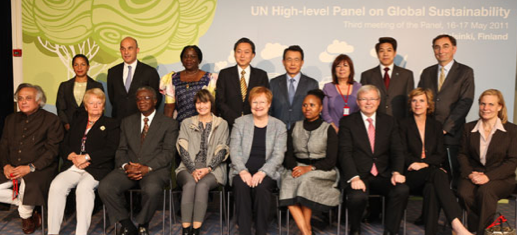According to the Executive Secretary of the UN Secretary-General's High-level Panel on Global Sustainability (GSP), the Panel's recent meeting in Helsinki resulted in an agreed outline for the final report and a clear work programme for drafting the report.
A full draft of the Panel's final report will be discussed in September 2011.
 1 June 2011: The Executive Secretary of the UN Secretary-General’s High-level Panel on Global Sustainability (GSP) has briefed UN delegates on the recent work of the Panel, particularly its third meeting, which met in May in Helsinki, Finland, and its plans for drafting the final report.
1 June 2011: The Executive Secretary of the UN Secretary-General’s High-level Panel on Global Sustainability (GSP) has briefed UN delegates on the recent work of the Panel, particularly its third meeting, which met in May in Helsinki, Finland, and its plans for drafting the final report.
Briefing delegates and others on 1 June 2011, at UN Headquarters in New York, US, Janos Pasztor said the Panel’s third meeting (GSP 3), which took place from 16-17 May 2011, in Helsinki, Finland, had resulted in two important items: an agreed outline for the Panel’s final report; and a clear work programme for its drafting. With these decisions, Pasztor said, the Panel had entered a “radically different phase” of its work, as the Panel had concluded general discussions and was ready to focus solely on text.
Per the agreed outline, the report will include three sections. The first section will address “where we are,” noting the current challenges to economic and social development and environmental protection, as well as current opportunities in those areas. The second section will address “where we need to be,” laying out the Panel’s vision for the “kind of world we want,” using the year 2050 as a general timeframe. This section will be based on the Panel’s overall goal, as agreed at the Panel’s second meeting (GSP 2): “To eradicate poverty and reduce inequality, make growth inclusive, and production and consumption more sustainable while combating climate change and respecting the range of other planetary boundaries.” Pasztor noted that the Panel has an interest in calling for goals on sustainability beyond the Millennium Development Goals (MDGs). The third and final section will address “how do we get there,” providing a road map of specific actions to be taken by governments, international organizations, the private sector and individuals.
According to Pasztor, the road map will be made up of actionable recommendations. Each recommendation will include the needed action, who should act, by when, compromises and tradeoffs that will be needed, and possible synergies between priorities. The recommendations will have a focus on specific sectoral and cross-sectoral priorities of the Panel. The sectoral priorities will be: access to clean and safe energy, access to water, food security, and decent jobs, with a focus on youth and sustainable enterprise. The cross-sectoral priorities – or, means to achieve the objectives in the above areas – will be: green growth, markets and finance, governance, gender equality and women’s empowerment, technology and political economy.
Per the agreed work programme for drafting the report, Pasztor said the GSP Secretariat’s lead writer currently is drafting the first two sections, for completion by the end of June. The third section will be drafted in July and August relying on short “cabinet papers,” policy papers focused on each priority area, which are under production by the Secretariat. The first full draft of the Panel’s report will be ready in September 2011 for discussion at the fourth meeting (GSP 4). The Secretariat will engage various experts in reviewing the contents of the report to ensure “high quality.”
Pasztor indicated that Panel members may wish to accelerate the final stage of their work or find other ways to give clear messages to States by the 1 November 2011 deadline for input to the UN Conference on Sustainable Development (UNCSD, or Rio+20) preparatory process.
Between now and GSP 4, the Panel members’ Sherpas are expected to meet in New York from 23-24 June, and in Beijing at the end of August. GSP 4 is scheduled for 18-19 September 2011.
During the interactive session of the briefing, two delegations stressed that the Panel does not have a mandate to submit officially its outcome to the UNCSD process, with one delegation expressing concern about the consequences of a green economy. Pasztor confirmed that the Panel’s report will be submitted only to the UN Secretary-General, who will determine whether to show it to member States. He also emphasized that the Panel had taken a broad view of green economy and was incorporating all considerations of its potential impacts.
Another delegation noted that all stakeholders – States, UN organizations, NGOs, etc. – have been invited to submit inputs to the UNCSD process, so there should be no problem with the GSP doing so.
One delegation urged the Panel to consider the Commission on Sustainable Development’s (CSD) agreed chapter on sustainable consumption and production (SCP), and Pasztor confirmed that it was doing so, although not in a formal, intergovernmental sense.
Finally, a delegation welcomed the outline of the report, expressed hope that States could see the Panel’s findings by the 1 November deadline for submissions for the UNCSD, and welcomed the use of experts to confirm accuracy, so that factual information in the report would not be subject to discussion. [IISD RS Sources] [Website of GSP]